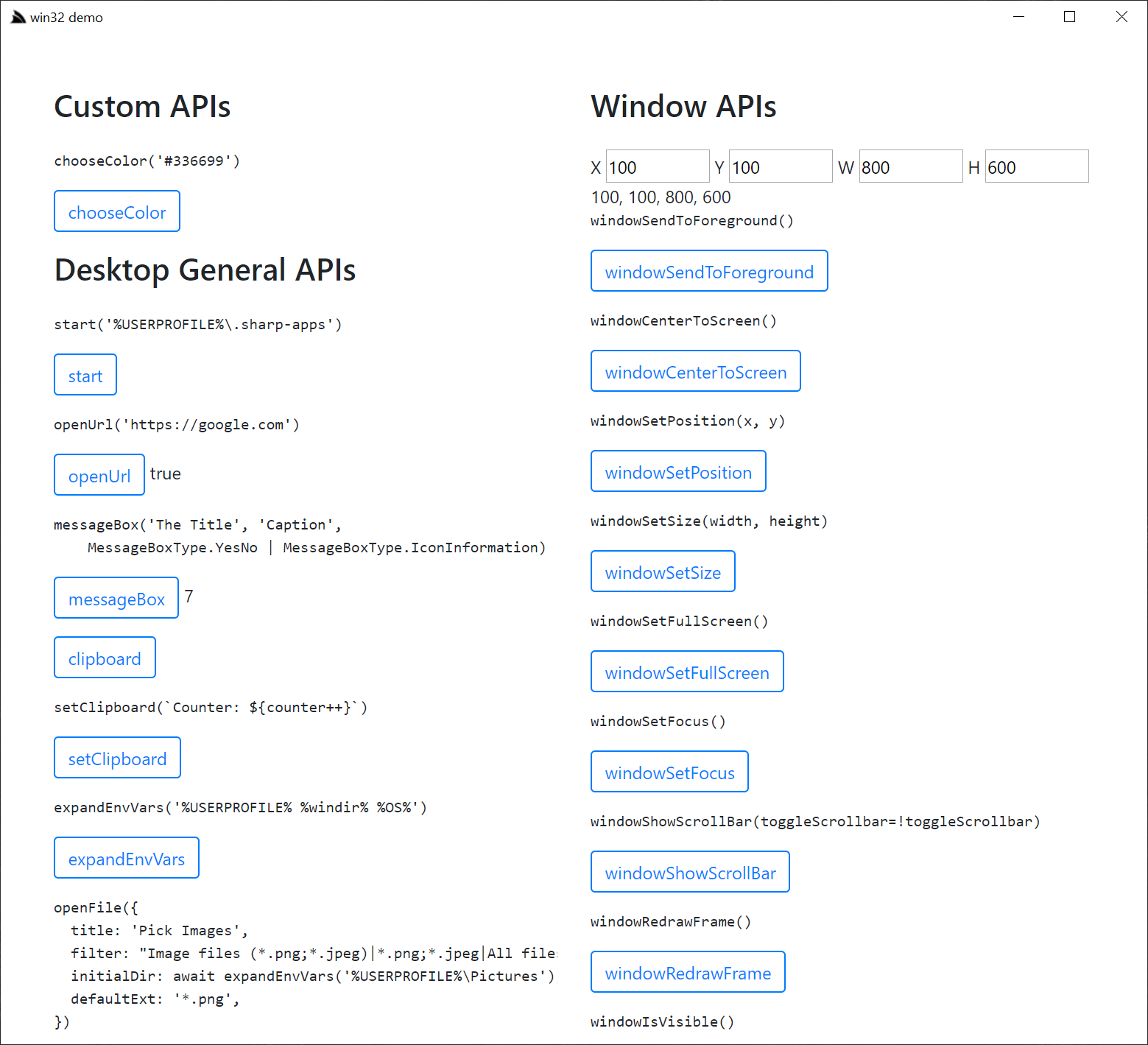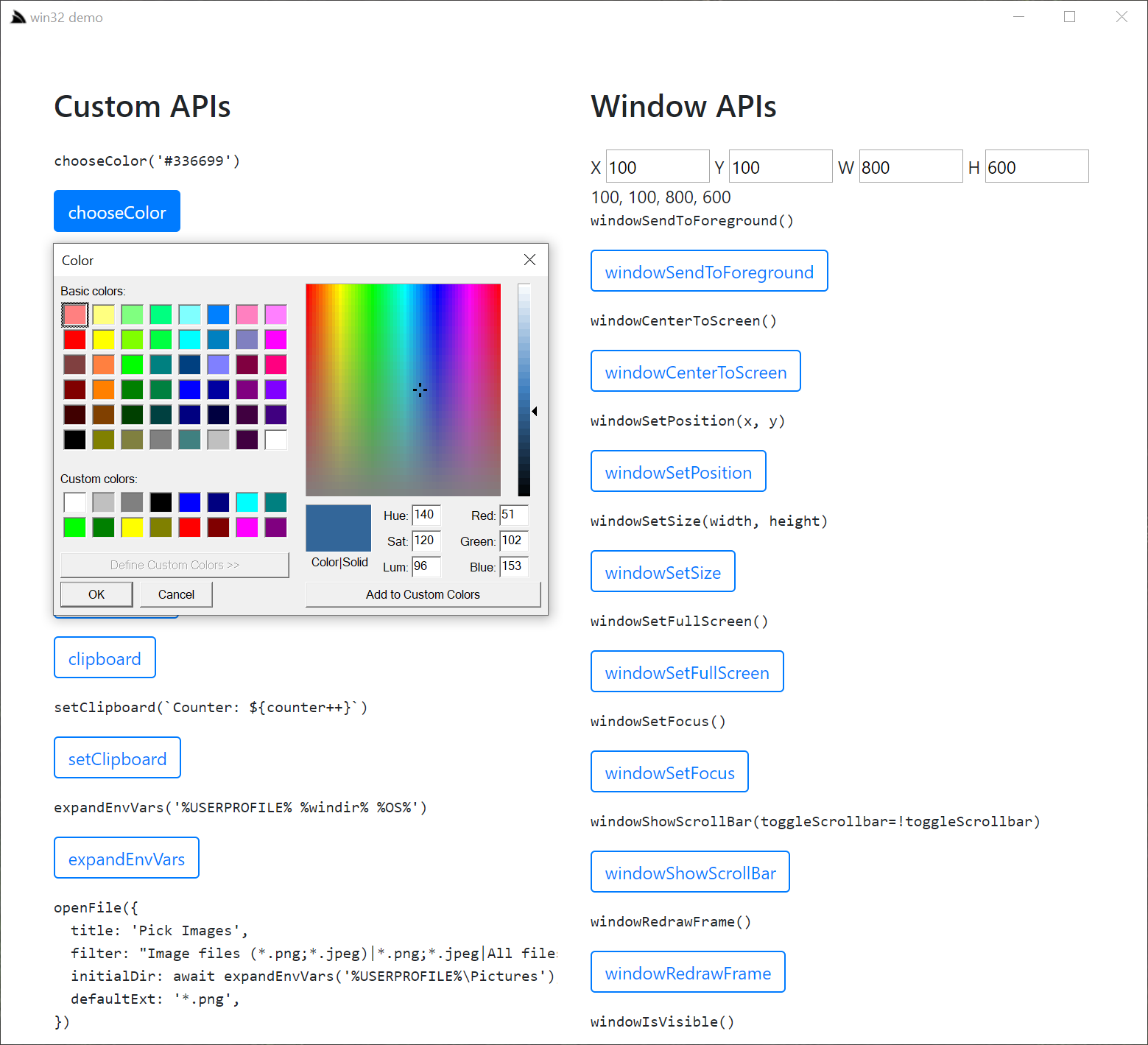App - Win32
The win32 Sharp App contains an examples dashboard of invoking different native Win32 functions:
You can run this Gist Desktop App via URL Scheme from (Windows Desktop App):
Or via command-line:
$ app open win32
Cross platform (Default Browser):
$ x open win32
Kiosk Mode
This app starts in full-screen Kiosk mode, enabled in its app.settings by:
CefConfig { Kiosk:true }
The main source code of this component is in Win32/index.ts,
which makes use of the built in TypeScript APIs below from @servicestack/desktop:
start('%USERPROFILE%\\\\.sharp-apps')
openUrl('https://google.com')
messageBox('The Title', 'Caption', MessageBoxType.YesNo | MessageBoxType.IconInformation)
await openFile( {
title: 'Pick Images',
filter: "Image files (*.png;*.jpeg)|*.png;*.jpeg|All files (*.*)|*.*",
initialDir: await expandEnvVars('%USERPROFILE%\\\\Pictures'),
defaultExt: '*.png',
})
openFile({ isFolderPicker: true })
deviceScreenResolution()
primaryMonitorInfo()
windowSetPosition(x, y)
windowSetSize(width, height)Custom Win32 API
You're also not limited to calling the built-in Win32 APIs above as calling custom APIs just involves wrapping the C# inside your preferred #Script method that you would like to make it available to JS as, e.g. here's the win32 implementation for launching Win32's Color Dialog Box and returning the selected color in HTML Color format:
public class CustomMethods : ScriptMethods
{
[DllImport("ComDlg32.dll", CharSet = CharSet.Unicode)]
internal static extern int CommDlgExtendedError();
[DllImport("ComDlg32.dll", CharSet = CharSet.Unicode)]
internal static extern bool ChooseColor(ref ChooseColor cc);
private int[] customColors = new int[16] {
0x00FFFFFF, 0x00C0C0C0, 0x00808080, 0x00000000,
0x00FF0000, 0x00800000, 0x00FFFF00, 0x00808000,
0x0000FF00, 0x00008000, 0x0000FFFF, 0x00008080,
0x000000FF, 0x00000080, 0x00FF00FF, 0x00800080,
};
public string chooseColor(ScriptScopeContext scope) => chooseColor(scope, "#ffffff");
public string chooseColor(ScriptScopeContext scope, string defaultColor) => scope.DoWindow(w => {
var cc = new ChooseColor();
cc.lStructSize = Marshal.SizeOf(cc);
var lpCustColors = Marshal.AllocCoTaskMem(16 * sizeof(int));
try
{
Marshal.Copy(customColors, 0, lpCustColors,16);
cc.hwndOwner = w;
cc.lpCustColors = lpCustColors;
cc.Flags = ChooseColorFlags.FullOpen | ChooseColorFlags.RgbInit;
var c = ColorTranslator.FromHtml(defaultColor);
cc.rgbResult = ColorTranslator.ToWin32(c);
if (!ChooseColor(ref cc))
return (string) null;
c = ColorTranslator.FromWin32(cc.rgbResult);
return ColorTranslator.ToHtml(c);
}
finally
{
Marshal.FreeCoTaskMem(lpCustColors);
}
});
}ServiceStack.Desktop's IPC takes care of invoking the #Script JS-compatible expression and returning the result:
var selectedColor = await evaluateCode('chooseColor(`#336699`)')The scope.DoWindow() extension method supports expressions being invoked in-process when launched by app.exe as well as when
invoked during development in "detached mode" if electing to run the .NET Core backend as a stand-alone Web App.
If your App calls your custom APIs a lot you can wrap it in a first-class TypeScript method that mirrors the server #Script method:
function chooseColor(defaultColor?:string) {
return defaultColor
? evaluateCode(`chooseColor(${quote(defaultColor)})`)
: evaluateCode(`chooseColor()`);
}Where it can be called using the same syntax in JS and #Script:
var selectedColor = await chooseColor(`#336699`)Highly productive live-reloading Development experience
If it weren't for the productivity possible for being able to only needing to develop for Chrome's state-of-the-art rendering engine where you can use advanced features like CSS grid along with the productivity of high-level productive Reactive UI frameworks like Vue, the effort into create a Desktop App like ServiceStack Studio wouldn't be justifiable.
After the next release we'll create pre-packaged project templates for vue-desktop and react-desktop Desktop Apps to make it easy develop Vue & React Desktop Apps along with scripts to bundle it & publish it to gist. If preferred app.exe also lets you deploy the published app to your own private repo & limit access to only users accessible with a GitHub token which they can open with from a URL with:
app://user/repo?token={GITHUB_TOKEN}
Or on the command line with:
$ app user/repo -token $GITHUB_TOKEN
Or without a token by setting it in the
GITHUB_TOKENEnvironment variable
For offline deployments the published /dist folder can be copied and launched with app (or x) in the app's folder:
$ app
For better Desktop integration this (or custom command-line arguments) can be wrapped in a new Windows Shortcut:
$ app shortcut
For a look at example Desktop App projects built using this development model can checkout ServiceStack/Studio or NetCoreApps/SharpData.

